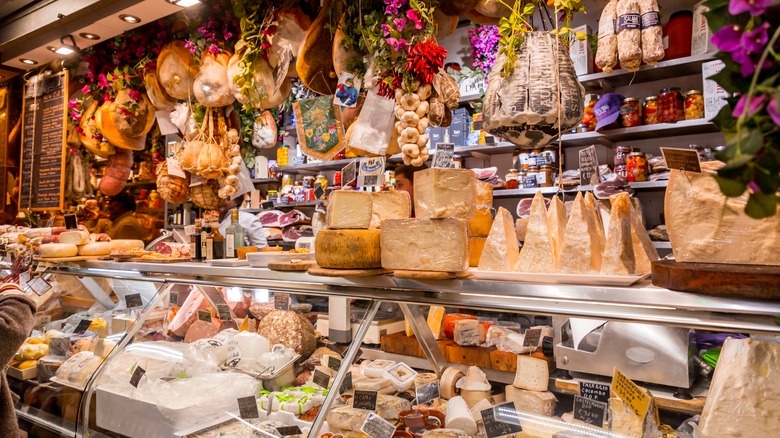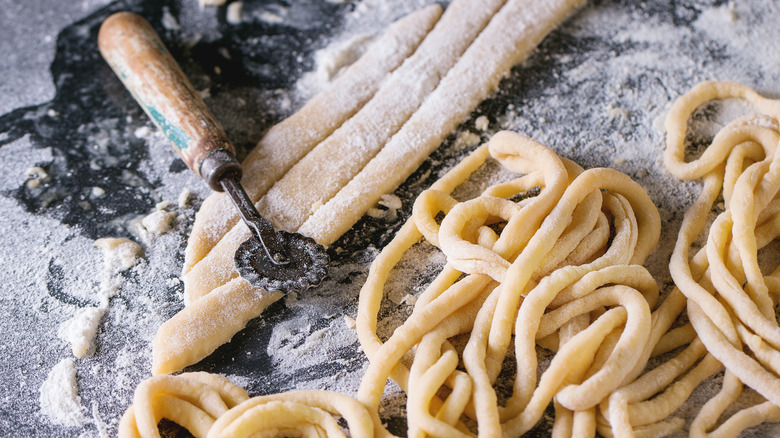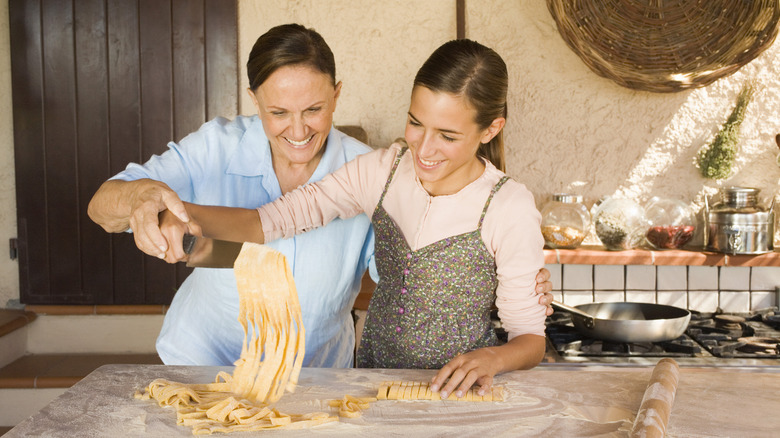This Is Where The Best Cooking Classes In Italy Take Place, Per Rick Steves
Florentine steak, offal sandwiches, and Chianti grapes are just a few regional delicacies that put Florence on the map as a culinary oasis. Anyone who's ever flâneured the streets of Italy can attest that food is one of the pillars of this country's extraordinary culture. It's not uncommon for Italians to spend hours in the kitchen rolling out pizza dough, shaping pasta shells, and dicing tomatoes all for the simple pleasure of rejoicing in nature's bountiful harvest. Travel expert and globetrotter Rick Steves can certainly attest to the cultural significance of food in this country. According to Steves, the harvest of regional staples make Florence the perfect city to satisfy your inner foodie through a Florentine cooking class.
Italian natives rely on simple seasonal ingredients, like vegetables, olive oil, herbs, and artisan bread for their world-class dishes. The chefs in Florentine have perfected the art of transforming these simple substances into a sensational spread of pastas, pizzas, and protein-rich plates. There's something so beautiful to learning about the significance of each ingredient that's become a hallowed staple for local dishes across Tuscany. Florence locals happen to have easy access to the region's freshest local produce, cheese, fruit, and oils at Mercato Centrale. This condensed food market caters to locals stocking up on staples for their home-cooked meals. Keeping constant tabs on the pulse of Florence's culinary scene, Steves shared some of his top tips for visitors hoping to dive into this European foodie destination through expertly-guided cooking courses.
The art of an authentic Florentine cooking class
Not every ingredient you'll find in Florence is created equal, and neither are its cooking classes. There's a few things visitors should look for when selecting a cooking class that will best showcase the true nature of Italian cuisine. According to Rick Steves, the ideal culinary class is one that takes place in a kitchen setting, rather than a classroom that tries to emulate a natural cooking environment. Classes should also be smaller to allow for questions and a personalized introduction into the country's food. The cooking experience is meant to be savored at the dinner table, and an authentic cooking class should follow the same formula, with guests sitting down to indulge in their newly-learned creations. Of course, what's the point of a cooking class if you can't replicate the joy of Italian cuisine for those in your hometown? Steves advises tourists to look for a class where the chef provides recipes to follow for future practice.
You'll more than likely walk away with a newfound knowledge of more than just the proper measurement of Italian flour for pasta dough in a Florentine cooking class. Italian cooking classes will also likely broaden your vocabulary. Rather than referring to stuffed shells and long, thin strips of dough simply as "pasta," you'll learn the difference between tagliatelle and tortellini pasta shapes. Italians also love to work with a variety of sauces, from marinara to pesto, and these will also likely be discussed in a class.
The best cooking classes in Florence
Just 7 miles outside the city of Florence, the Cooking Studio at La Quercia Estate is a top-ranked foodie destination in Italy, according to Forbes. This 17th-century farmhouse functions as a restorative culinary-themed getaway. Cooking classes at this historic estate are family-led, helmed by trained chef Veronica Clemente, whose recipes are gathered from her grandmother's stash of old formulas. Clemente's daughter (a sommelier) is also an active participant in these lessons, and the two lead classes through a traditional five-course Italian meal, followed by a family-style lunch or dinner. Surrounded by sprawling vineyards and rolling hillsides dotted with olive groves, this picturesque estate is a must-visit spot in Tuscany.
The only thing better than twirling your fork through freshly made pappardelle is hand-rolling pici in the midst of a Tuscan vineyard. According to National Geographic, pici is a regional speciality and something Magida Brunello Cooking Class is all too familiar with. This enamoring estate holds small group cooking classes in the kitchen of its historic Castello Tricerchi Winery situated among the rolling fields of Tuscany. The immersive, hands-on courses range from a Pasta Masterclass that explores the history of Tuscany's 300+ forms of pasta, to the private Sunset Cooking Class that's followed by dinner on the castle's terrace. Guided by an "Eat. Love. Cook." philosophy, chef Alexandra Barac embraces the significance of allowing the seasons to guide one's cooking, bringing out the best of Tuscany's seasonal harvest in each of her classes.


